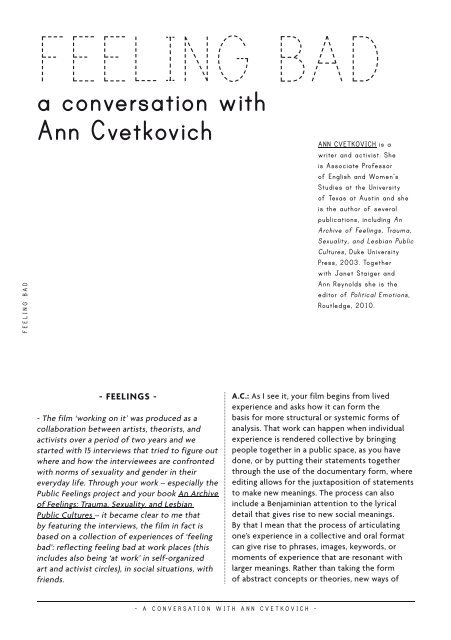a conversation with ann Cvetkovich - karin michalski
a conversation with ann Cvetkovich - karin michalski
a conversation with ann Cvetkovich - karin michalski
Create successful ePaper yourself
Turn your PDF publications into a flip-book with our unique Google optimized e-Paper software.
feeling bad<br />
feeling bad<br />
a <strong>conversation</strong> <strong>with</strong><br />
<strong>ann</strong> <strong>Cvetkovich</strong> <strong>ann</strong> CveTkOviCh is a<br />
writer and activist. She<br />
is associate Professor<br />
of english and women’s<br />
Studies at the University<br />
of Texas at austin and she<br />
is the author of several<br />
publications, including an<br />
archive of feelings, Trauma,<br />
Sexuality, and lesbian Public<br />
Cultures, duke University<br />
Press, 2003. Together<br />
<strong>with</strong> Janet Staiger and<br />
<strong>ann</strong> Reynolds she is the<br />
editor of Political emotions,<br />
Routledge, 2010.<br />
- feelings -<br />
- The film ‘working on it’ was produced as a<br />
collaboration between artists, theorists, and<br />
activists over a period of two years and we<br />
started <strong>with</strong> 15 interviews that tried to figure out<br />
where and how the interviewees are confronted<br />
<strong>with</strong> norms of sexuality and gender in their<br />
everyday life. Through your work – especially the<br />
Public Feelings project and your book An Archive<br />
of Feelings: Trauma, Sexuality, and Lesbian<br />
Public Cultures – it became clear to me that<br />
by featuring the interviews, the film in fact is<br />
based on a collection of experiences of ‘feeling<br />
bad’: reflecting feeling bad at work places (this<br />
includes also being ‘at work’ in self-organized<br />
art and activist circles), in social situations, <strong>with</strong><br />
friends.<br />
- a COnveRSaT i O n wiT h a nn CveT k O viC h -<br />
a.c.: As I see it, your film begins from lived<br />
experience and asks how it can form the<br />
basis for more structural or systemic forms of<br />
analysis. That work can happen when individual<br />
experience is rendered collective by bringing<br />
people together in a public space, as you have<br />
done, or by putting their statements together<br />
through the use of the documentary form, where<br />
editing allows for the juxtaposition of statements<br />
to make new meanings. The process can also<br />
include a Benjaminian attention to the lyrical<br />
detail that gives rise to new social meanings.<br />
By that I mean that the process of articulating<br />
one’s experience in a collective and oral format<br />
can give rise to phrases, images, keywords, or<br />
moments of experience that are resonant <strong>with</strong><br />
larger meanings. Rather than taking the form<br />
of abstract concepts or theories, new ways of


